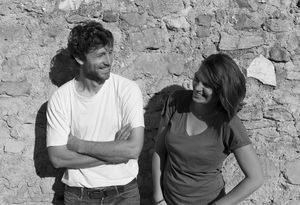Make your own organic wine in the Terrasses du Larzac vineyards of southern France
- Categories :
- Wine Making
- Languedoc-Roussillon
- Château de Jonquières
The magnificent Château de Jonquières is one of the oldest family-run wineries in the Languedoc, and has been in the same family for over 900 years! Charlotte and Clément de Béarn, the winery’s 32nd generation of winemakers, took over the running of the vineyard and wine-making operation at Château de Jonquières in 2014 from Charlotte’s parents, and continue to strive to make the best possible organic wines from the different vineyard plots that surround the listed château. It’s the perfect place, with the perfect hosts, to learn more about all of the hard work and skill that goes into making great organic wines.
We got together with Charlotte and Clément to prepare this profile that we share with you so that you too can get to know our new partner winemakers.

Charlotte and Clément, how long have you been wine-makers?
Charlotte : I grew up here in Jonquières and then studied business in Paris, Ireland, Athens, Reims and then closer to home in Pezenas for the wine-making studies.
Clément : I grew up in Montpellier, where I also studied, before working in Marseille, Lyon and Sydney.
After a summer working together to manage the table d’hôte at Château de Jonquières, we decided to take over the wine-making operations at the age of 24, just after our studies ended. When we decided to do so, Clément had never stepped a foot into a vineyard, and it was less than two years that we had been together. When we announced our intentions to my parents, they were very pleasantly surprised and accompanied us as we set out on our journey, whilst remaining very flexible and letting us know that we would always back track if needed.
Looking back, we don’t regret for one second having started so young. We were full of energy, even if we were definitely a little naïve!
What has been your journey since you took over the winery?
We took over from Charlotte’s parents in 2014 by buying the vineyards, buildings, material, and stock. We live with our two daughters in the old estate manager’s quarters of the château. We’re completely independent of Charlotte’s parents, but all 6 of us live in the same place, together with the vines, our vegetable patch and chicken coup.
We became organically certified and produce 30 000 bottles or red, white, and rosé wines, which we sell to wine-merchants, restaurants, private customers and export.
We have introduced commented guides for the château and its history, the cellar and wine tastings. We also offer an ephemeral bistrot each summer for the last 4 years in the courtyard, and organise a concert or play every two years. We have also taken some bookings for corporate seminars.
What is your best memory so far concerning the winery?
We are already very fortunate to have a job that is varied and hands-on, where we don’t notice the time fly by. We’ve also successfully managed to create an environment that allows us to live independently, and to welcome our visitors and clients to the winery.
But our proudest moment is the first harvest from the plot of Grenache blanc that we planted in 2017. A fantastic moment with our baby vines!
What are your principal projects or challenges for 2021?
We’re looking to further develop the White Label cuvée, a wine that is completely off the charts that we launched on a small scale two years ago. It’s a wine made using 100% Carignan grapes that were planted by my great-grandmother 80 years ago. The wine is then aged in oak “demi-muid” 500 litre barrels, a type of large barrel that was originally used to transport wine. Like a vinyl record that is pressed in a very small number of copies, the White Label, is for the moment a very limited series wine.
We also have plans to replant a vineyard using massally selected vines, taking cuttings from our best vines to transmit their genes, rather than using cloned vines. We’ll use our older vines that are more than 40 years old, because they have a richer genetic make-up. It will enable our vines to be hardier and to redevelop some of the characteristics that have been lost little by little with the use of cloned wines. For example we’re hoping they’ll benefit from maturing more slowly, and being more resistant to coulure during the flowering period.
There are also a few challenges to contend with. After two years with harvests 40% less than usual, we worry about the changing climate and what impact that will have. We’re also worried about wine sales in light of the Covid-19 situation and the international market which is struggling. But we’ll get through it, adapt, and continue to refine our wines to try and express who we are through them.
A question that our clients often ask. What do winemakers do when they have a little time to themselves?
Clément : I like to cook. Bread, cakes, bœuf bourguignon, and other dishes that I like to pair with wines that I’ve discovered in other regions during my travels!
Charlotte : I started jogging a year ago. I’ve done my first trail and want to do more!
Learn more about adopting vines at Château de Jonquières




